________________
IPRAMĀNA ARTHĀPATTI AND ABHAVA
-part of thought is not true of this object then as here conceived an inference is not at all,true of its object while for all practical purposes a perception too is not true of its object. 61 The Buddhist pleads that a distinction be made between a real ultimately speaking and a real practically speaking, so that Jayanta's objection ceases to hold in case the 'series' here spoken of is treated as a real practically speaking even if not a real ultimately speaking; Jayanta dubs this strategem escapist and emphasizes that what thought reveal is something ultimately real, not something just practically real, further adding that if the 'series' posited by the Buddhist is something practically real why not ‘universal' etc. posited by the Nyāya philosophy.89 There is much point in what Jayanta says and yet the fact remains that the Buddhist's declaration that a perception is all true of its object while a thought is all false of it is a highly technical proposition; thus for all practical purposes a perception as here conceived is neither true nor false of its object in the ordinary sense while a thought as here conceived is true or false of its object in the ordinary sense. And then there is nothing seriously objectionable about the Buddhist contention that if the identification of its object on th: pirt of a cognition is right this cognition is valid, otherwise not.
Incidentally, Jayanta here raises a relatively minor point which however leads to an important discussion. Thus the Buddhist has spoken of a cognition receiving confirmation in subsequent practice, Now Jayanta objects that the question of practice arises only in case the object concerned happens to be favourable or unfavourable but not at all in case it happens to be neutral; the suggestion that the categeory 'neutral' be included under the category 'unfavourable' is rejected as being akin to the suggestion that the category 'neuter' be included under the category 'female' (or under the category 'male'). 63 The Buddhist pleads that Jayanta's present objection is not important inasmuch as a cognition can well be valid or otherwise even in case relevant practice is not actually undertaken (an old point); Jayanta understands it to mean that a cognition is valid without requiring to




